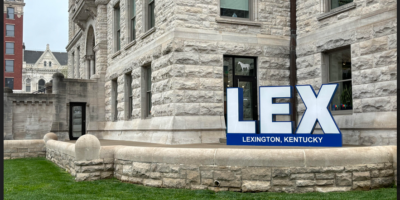By Maria-Karen Lopez
As a resident of the Commonwealth and vice-president of the Kentucky Dream Coalition, I am concerned about our immigrant community’s advocacy and collective action concerning anti-immigrant laws. Considering that Lexington’s increase in immigrant population ranks third nationally, it is important to remember the Commonwealth’s values for all our residents, including our immigrant community: “Together we stand, divided we fall.”
Last year in Kentucky, Senator John Schickel’s SB 6 was passed out of the Senate in early January, following Arizona’s SB 1070 anti-immigrant legislation. However, we saw that such policy was not in the best economic interest for our Commonwealth. According to the fiscal-impact statement, the law was estimated to cost the state $89 million per year. The bill was not passed in the House Local Government Committee and is considered dead — for now.
Within our immigrant community exists contributing, hard-working families and students who are undocumented. Their lack of documented status is not optional, considering that our federal immigration system is broken, leaving many with a prolonged wait. Because 70 percent of immigrants come from Mexico, filing for residency by someone from Mexico can take over 16 years. These undocumented families live content making a few dollars a week for a better way of life by taking the unskilled jobs that most U.S. citizens would not do.
There is a national consensus that our immigration laws must change, and since Arizona passed SB 1070, many other states have adopted similar laws that target these hard working immigrants and undocumented families. Such policies should be reviewed thoroughly since they impact Kentucky from the working sector to education. The future of our Commonwealth is the children, who want to succeed by going to college and contributing as skilled workers in Kentucky. Nationally, there are 65,000 undocumented students who graduate high school each year; as a child of an unskilled worker, they cannot afford college.
The DREAM Act
The most practical way to help change federal law is by supporting and advocating for the DREAM Act, bipartisan legislation that addresses the undocumented status of immigrant students who grew up in the United States. Under current laws, these young people inherit immigration status from their parents, who are undocumented or in the process of gaining residency. However, these young immigrants have no means to obtain legal residency, even if they have lived most of their lives in the U.S.
If re-introduced and passed by both the House and Senate, the DREAM Act would provide a pathway to citizenship for undocumented students who meet certain conditions. In order to be eligible under this revised version of the DREAM Act, an undocumented student must meet four basic requirements: the student must have entered the United States before the age of sixteen, have graduated from high school or obtained a GED, have good moral character and no criminal background, and have had at least five years of continuous presence in the U.S.
Furthermore, if the student meets all four requirements, once the DREAM Act passes, he or she would have to obtain a two-year college degree or serve in the military. At this point, qualified undocumented students would be permitted to apply for conditional non-immigrant status. Finally, if an individual meets all these requirements, after a three-year wait he or she will be eligible for citizenship.
The movement for the DREAM Act is growing. On June 28, over 200 DREAMers, including three from Kentucky, went to Washington D.C. to be part of the first ever DREAM Act hearing. These DREAMers asked our legislators to support the DREAM Act and to hold President Obama accountable for his words and actions.
The activists also prepared the “Deportation Class of 2011,” concluding it with a DREAM Act graduation, which highlighted the plight of undocumented youth in deportation proceedings. Among the speakers at the graduation were undocumented youth in deportation proceedings; Jose Antonio Vargas, a famous journalist who just came out as being a DREAMer; and Senator Dick Durbin of Illinois, champion of the DREAM Act since 2001. After the graduation ceremony, DREAMers from all over the nation walked for over 40 minutes to the White House, where they chanted and shared stories with the legislature.
The Georgia Six
Meanwhile, in Atlanta, GA, I and three members of the Kentucky Dream Coalition attended the “Georgia Six” civil disobedience near the state capitol building. The action consisted of six undocumented students aiming to take a stand against HB 87, a recently passed law modeled after Arizona’s SB 1070 that would severely restrict and isolate the immigrant community in Georgia.
While the civil disobedience took place in Georgia, I looked at these young high school graduates, wondering about their courage in standing up to a police officer and saying: “I am not afraid, I am here for you to arrest me.” It scares me to think of what these policies do to communities; I worry about Lexington, which is about to come to a voting session, and the impact that it will have on our immigrant community.
In Georgia, I had the opportunity to talk to Leeidy Solis, 16, one of the students participating in the action. She warned that, before the bill passed in Georgia, they had a few police stops here and there; however, within weeks of the bill’s passage, police were targeting anyone that “looks different.” “We never expected things to get this bad. It is time for undocumented youth across the South to come out and fight against injustice,” Solis said.
In Kentucky, we can take Solis’s words as a forewarning. We must figure out where our legislatures stand on immigrant issues in our upcoming November election, so that individuals like those in the Georgia Six are not the only ones taking a stand for undocumented students.
We are not alone
“We are not alone” is the message I gained from my experience in Georgia. In fact, there are millions of undocumented immigrants and allies across the nation. By collaborating with other states against anti-immigrant laws that oppress communities, our advocacy becomes greater and changes begin. In an effort to bring awareness and hope to our communities, the Kentucky Dream Coalition will begin to collaborate with the DREAMers from all over the nation.
From the trips to Washington and Georgia, the Kentucky Dream Coalition came home motivated to educate our community through “Know Your Rights” workshops. I feel hopeful and empowered to help my community, knowing that there is so much support nationwide for the DREAM Act and for our immigrant communities.
It’s time for change. With high deportation rates and anti-immigrant laws persecuting the undocumented populations in the U.S., our system of democracy and value of freedom are endangered. Join the DREAMers and create change.
For more information, visit the Kentucky Dream Coalition on Facebook.





Leave a Reply